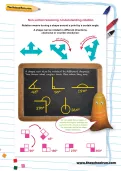Important update from TheSchoolRun
For the past 13 years, TheSchoolRun has been run by a small team of mums working from home, dedicated to providing quality educational resources to primary school parents. Unfortunately, rising supplier costs and falling revenue have made it impossible for us to continue operating, and we’ve had to make the difficult decision to close. The good news: We’ve arranged for another educational provider to take over many of our resources. These will be hosted on a new portal, where the content will be updated and expanded to support your child’s learning.
What this means for subscribers:
- Your subscription is still active, and for now, you can keep using the website as normal — just log in with your usual details to access all our articles and resources*.
- In a few months, all resources will move to the new portal. You’ll continue to have access there until your subscription ends. We’ll send you full details nearer the time.
- As a thank you for your support, we’ll also be sending you 16 primary school eBooks (worth £108.84) to download and keep.
A few changes to be aware of:
- The Learning Journey weekly email has ended, but your child’s plan will still be updated on your dashboard each Monday. Just log in to see the recommended worksheets.
- The 11+ weekly emails have now ended. We sent you all the remaining emails in the series at the end of March — please check your inbox (and spam folder) if you haven’t seen them. You can also follow the full programme here: 11+ Learning Journey.
If you have any questions, please contact us at [email protected]. Thank you for being part of our journey it’s been a privilege to support your family’s learning.
*If you need to reset your password, it will still work as usual. Please check your spam folder if the reset email doesn’t appear in your inbox.
Top tips for surviving the 11+

When it comes to the 11+ we really have been there, done that.
First time around, when my husband and I were new to the whole mysterious process, it did feel overwhelming at times, and we had our fair share of tears and slammed doors (and that was just me, not the 10-year-old). But I have to say that with number four I am feeling remarkably relaxed about the whole thing – probably because I have picked up so many tips and good advice over the years.
So, if you’re the parent of a child just embarking on their 11+ "adventure", here are a few of my own words of wisdom, as well as pointers from friends and tutors I’ve spoken to.


Prepare Your Child For The 11+ Exam
- Essential 11+ English and maths skills
- Verbal and non-verbal reasoning questions
- Reading comprehension & CLOZE test worksheets
Here we go – in no particular order!
- Don’t start 11+ preparation too soon. Really, this is a biggie. You don’t need to begin looking at 11+ questions any earlier than the beginning of Year 5. Twelve months is plenty. I know you’ve probably heard stories of children who started in Year 1, but believe me, it’s unnecessary and possibly counter-productive. They’ll be sick of it and so will you.
- Read, read, read... and then read some more. While hitting the 11+ books too soon is a bad idea, it’s never too early for your children to start devouring fiction and non-fiction books. Vocabulary plays a big part in 11+ success and reading is, of course, a brilliant way of learning new words. If your son or daughter is a reluctant reader, visit the library or a good book shop and ask for tips on what other children their age are enjoying.
- Spend a minute or two at the start of each week agreeing a time slot for any work that has to be done, and try to stick to what you’ve decided. If I’d done this more often with child number one I’d have saved myself a lot of “Can’t I do it tomorrow?” type conversations, which usually ended with both of us feeling decidedly grumpy.
- Expect the odd meltdown. You might be lucky and find your son or daughter breezes through the 11+ preparation and exam with barely a grumble, but I’ve yet to speak to a parent who hasn’t had to deal with at least the odd tear or tantrum. Don’t worry about it; it’s normal. Just keep giving them lots of encouragement and hugs.
- Be strict about bedtimes. It’s tiring getting ready for a big test and a well-rested child will be able to cope with the inevitable pressure and nerves much better than a fractious, tired one.
- Make lots of time for fun and try to keep life as normal as possible. It’s all too easy to let the 11+ consume your household – especially as the test date gets nearer – but try to keep things in perspective and remember it won’t go on forever (even if it feels that way).
Hire an 11+ tutor or do it yourself?
We’ve prepared for the test both ways and both ways worked. Make a decision based on you and your child (and of course your finances), not on what everybody else is doing.
The DIY method
If you feel confident (and patient) enough to tutor your son or daughter and think you can both make it through 12 months intact, go for it.
There are plenty of very easy-to-use guides which take you through the different question types step-by-step (including TheSchoolRun's 11+ Learning Journey programme!). When I tutored child number two I started by teaching her the best techniques for answering each question type and made sure she was really secure with these before we even glanced at an exam paper.
The first few full papers she attempted took her well over the allowed time (like an hour over!), but we just worked on knocking off a minute or two every week.
If at first it feels like too big a mountain to climb, don’t panic! It really is a case of “slow and steady wins the race” and in my experience one to two hours of tutoring plus an hour of homework is more than enough for a 10- or 11-year-old to manage on top of all the other things they have to do.
The tutor route
If your child is bright but not much of a self-starter (i.e. they’d rather do anything than come inside for a verbal reasoning session!) a tutor might be the best choice. If you decide this is the way to go, ask people for their recommendations. Popular tutors get booked up well in advance, so putting your child’s name on their waiting list is something I’d suggest doing early.
Keep communicating. If your child is getting upset, feeling anxious or finding some of the work difficult, let the tutor know. They’ll be able to help and might want to adjust their lesson plans accordingly.
An experienced tutor knows exactly what your child needs to do to pass the test and should be giving you regular updates on their progress. The best ones make learning – even for the 11+ – fun and are great at motivating their students.
Preparing for the 11+ is tough, there’s no doubt about it, and it’s not something to embark upon lightly. But if you’re certain that grammar school would be the best place for your child, and they are willing to work hard to get there, take a deep breath and go for it. It’ll be over before you know it!








